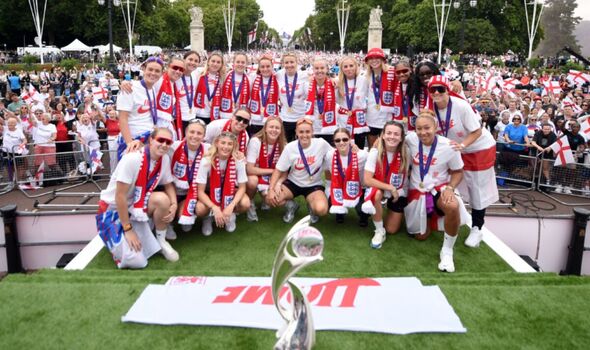A fervent debate has ignited within the British sporting landscape concerning the allocation of prestigious national honours following the England Lionesses’ historic triumph at Euro 2025. This discussion centers on whether the collective achievements of the women’s football team should overshadow individual brilliance in other disciplines, sparking widespread conversation among fans and pundits alike.
The nation recently celebrated the Euro 2025 winners with an exuberant parade through the capital, drawing thousands of enthusiastic supporters who converged to commend their beloved team’s monumental success. This public display of admiration underscored the profound impact the Lionesses have had on the sport and national morale.
With their unprecedented victory, many anticipated a cascade of significant accolades and commendations to be bestowed upon the team members and their leadership. Indeed, the head coach, Sarina Wiegman, was widely tipped for a prominent personal honour, reflecting her pivotal role in guiding the squad to European glory.
However, a notable voice from within the sporting elite, Barry Hearn, the esteemed founder of Matchroom Sport, has introduced a contrasting viewpoint that challenges the conventional wisdom. Hearn publicly asserted that while the England Lionesses undoubtedly deserve collective recognition, a different sporting personality should receive the ultimate individual prize.
Hearn specifically championed Luke Littler for the top individual gong, highlighting the darting sensation’s exceptional year as a compelling argument for his candidacy. He posited that while the Lionesses are strong contenders for the ‘Team of the Year’ award, the individual sporting landscape in the past year hasn’t produced another standout candidate quite like Littler.
This perspective fuels a broader discussion about the criteria for such esteemed awards, prompting an examination of whether a team’s collective success, as exemplified by the Lionesses’ Euro 2025 victory, should always translate into individual honours for its members, or if exceptional personal performances in other sports should take precedence.
The emphasis on the team prize for the England Lionesses by figures like Hearn underscores the unparalleled nature of their collective achievement in women’s football. It suggests a recognition that their triumph was a symphony of individual talents working in perfect harmony, rather than the singular dominance of one athlete.
Amidst this unfolding discourse, Lionesses’ manager Sarina Wiegman herself has weighed in on the prospect of receiving an honorary damehood from the Royal Family, acknowledging the immense respect she feels. Her humble response emphasized the significance of the recognition from both England and the public.
Wiegman’s sentiment reflects the profound connection established between the team and the nation, indicating that while personal awards are appreciated, the overwhelming respect and admiration from the public remain the most cherished aspects of their historic Euro 2025 journey. This ongoing debate about sporting honours adds another layer to their remarkable story.






Leave a Reply